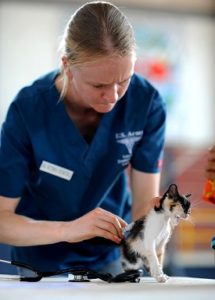 This is a post about diseases that our cats can have as they are aging. It is just a quick summary and does not go into causes or what treatment is right for any particular cat.
This is a post about diseases that our cats can have as they are aging. It is just a quick summary and does not go into causes or what treatment is right for any particular cat.
Over the years, I have adopted several older cats – 8 that were 10 yrs. old or older. The oldest was 16. So, I went through their later years earlier in our relationship than if they had been younger when they came to me. I also was a cat sitter and cared for some older cats.
It is not uncommon for cats now to live well into their teens or even into the twenties. My cat Kitty was 22, and George and Bogey were 19 when they transitioned.
There are a few illnesses that are common in aging cats. PetMD lists 7 illnesses as most common: Kidney disease, heart disease, diabetes, arthritis, hyperthyroidism, dental disease and cancer. I have experienced all of these except for diabetes in my own cats. I cared for a couple of sweet older cats with breast cancer during my time as a cat sitter.
You can manage some of these with medication, others with other means.
Kidney disease can be helped with diet and sub-1 fluids (using an IV to administer fluids into the space under the skin of the cat).
Heart disease can be treated with the same types of medication for humans – diuretics, beta-blockers, calcium channel-blockers, aspirin, ACE inhibitors and blood pressure drugs.
Diabetes can be managed by diet and insulin injections.
Arthritis pain can be helped with supplements, flower essences, or pain medications.
Hyperthyroidism can be managed with medication, removal of the thyroid gland, or radioactive treatment (which requires a 10-14 day stay at the treatment facility).
Dental disease comes in different forms, periodontal disease, tooth resorption and stomatitis being three. Affected teeth may need to be extracted. I have had a few cats (including my 7 1/2 cat Penelope who had 4 teeth removed due to periodontal disease and tooth resorption this week). Cats can still eat after having teeth removed.
Cancer rates in cats are half of that in dogs, but in cats it tends to be a more aggressive form. Treatments for cancer include surgery, chemotherapy and radiation.
This has been just an overview of what can occur in our beloved aging cats. I recommend annual exams by your veterinarian, and perhaps more frequent as your cat gets older. Blood tests can detect some diseases early, so treatment can be started sooner, and your cat may have a longer life.
I hope this has been helpful. Please comment on your experiences below. I plan to write more about our aging pets, and how we can help them with the aging process, and ultimately help them and ourselves through the end of their life.
